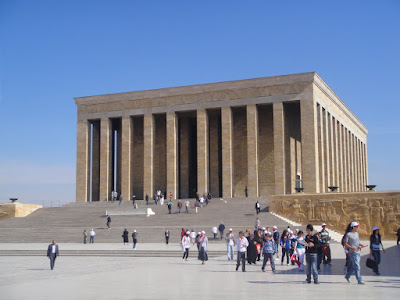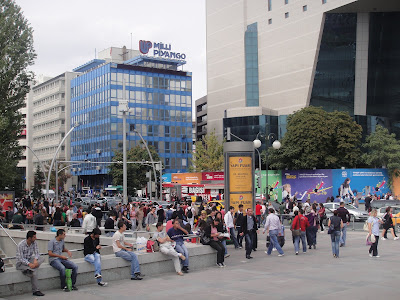"I'd hoped the language might come on its own, the way it comes to babies, but people don't talk to foreigners the way they talk to babies. They don't hypnotize you with bright objects and repeat the same words over and over, handing out little treats when you finally say "potty" or "wawa." It got to the point where I'd see a baby in the bakery or grocery store and instinctively ball up my fists, jealous over how easy he had it. I wanted to lie in a French crib and start from scratch, learning the language from the ground floor up. I wanted to be a baby, but instead, I was an adult who talked like one, a spooky man-child demanding more than his fair share of attention."
-David Sedaris
Few things are more humbling than starting from scratch in a language completely unfamiliar to you. All your education and intelligence is suddenly irrelevant, because you lack the tools to express anything you know. Well-meaning people try to help you by explaining things, but all you can do is nod and smile, acknowledging their politeness and trying to hide your embarrassment at not understanding a word.
This is an incredibly frustrating experience for me, since I'm a person who likes to understand my surroundings. But it's probably healthy. Professionally, it helps me become more sympathetic with students who feel overwhelmed by English. Spiritually, it reminds me how weak I am and how much I do need to rely on God to get me through each day.
That being said, I'm very thankful for our Turkish teacher, who for the past week has been showing up to dutifully drill Turkish into our heads two hours a day. The language is still like a flood, and for now I am most certainly drowning.
In five lessons, we've encountered about 200 words and several grammatical constructions like, "Is this a man or a woman?" "Are these knives? Yes, they are." "What's on the house? The small dogs are on the house." and "What is this place? This is not a hospital, it's a bank!" Yes, it really does seem that ridiculous at times.
So far we're only capable of painfully obvious statements and caveman-esque requests like, "What? I small understand. Bread, please! Okay, okay." But eventually it will start to make sense. I hope.
Meanwhile, the explorations of historical and cultural sites continue and next week we'll start the process of job interviews and getting into schools and real housing where we don't have to sleep on piles of foam mattresses like in "The Princess and the Pea." We're praying this goes smoothly and that things work out.

 October 29 is Republic Day, the anniversary of the founding of the Turkish Republic in 1923. It's a national holiday, so schools and many businesses were closed. There was a parade this morning, but we didn't attend. But we did see that everyone was flying their national colors today. These ranged from very small:
October 29 is Republic Day, the anniversary of the founding of the Turkish Republic in 1923. It's a national holiday, so schools and many businesses were closed. There was a parade this morning, but we didn't attend. But we did see that everyone was flying their national colors today. These ranged from very small:
 I already knew that Turks are very patriotic, but today I got a much better glimpse into how proud they are of their country. Just walking around you could get a sense of the pride they take in their republic. People had flags and little pictures of Atatürk on their car windows and hanging from their rearview mirrors driving around. Every bus had a flag flying on the front corner. Some guys on the bus saw us looking and pointing at the sheer quantity of flags displayed, and proudly asked us what we thought about it.
I already knew that Turks are very patriotic, but today I got a much better glimpse into how proud they are of their country. Just walking around you could get a sense of the pride they take in their republic. People had flags and little pictures of Atatürk on their car windows and hanging from their rearview mirrors driving around. Every bus had a flag flying on the front corner. Some guys on the bus saw us looking and pointing at the sheer quantity of flags displayed, and proudly asked us what we thought about it.














